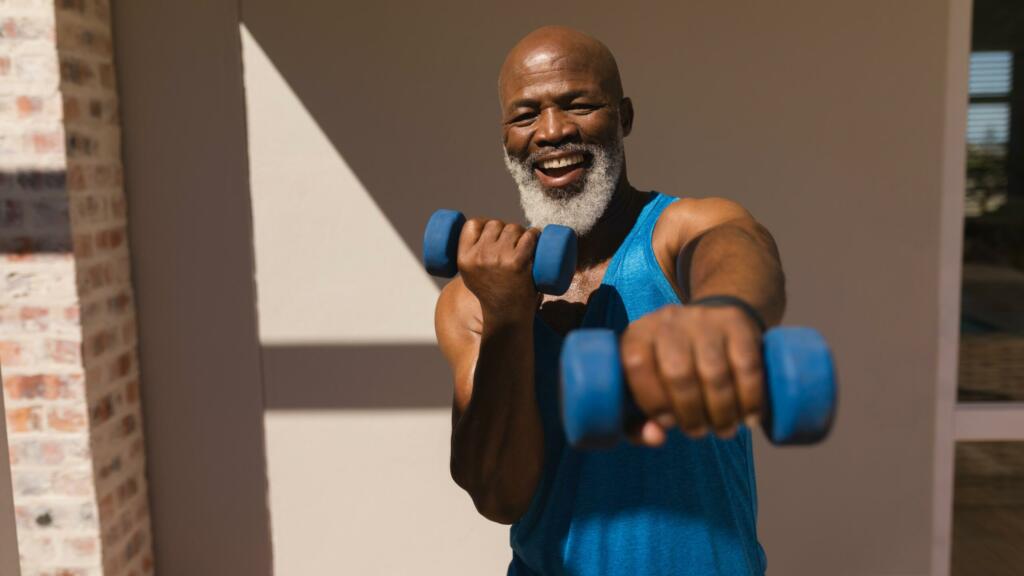
5 benefits of running that will convince you to start
Rebecca Frew
Exercise has a positive impact on your mental and physical wellbeing – great reasons for you to get moving.
Exercise is a wonderful thing. Not only is it a chance to move your body, but you also get to improve your health and wellbeing at the same time.
Yet many people dread it, or they see it as punishment for what they ate. It becomes something that must be done, as opposed to something we enjoy doing.
Often, the issues people think will be a barrier to them exercising – such as high blood pressure, joint issues, or back pain – can be reduced or even eliminated by moving more.
As a fitness writer, instructor and personal trainer, I have been privileged to inspire many people to exercise more. It’s a joy for me to see them progress, improve, and enjoy exercise, until it becomes non-negotiable for them.
Exercise is a wonderful thing. Not only is it a chance to move your body, but you also get to improve your health and wellbeing at the same time.
Yet many people dread it, or they see it as punishment for what they ate. It becomes something that must be done, as opposed to something we enjoy doing.
Often, the issues people think will be a barrier to them exercising – such as high blood pressure, joint issues, or back pain – can be reduced or even eliminated by moving more.
As a fitness writer, instructor and personal trainer, I have been privileged to inspire many people to exercise more. It’s a joy for me to see them progress, improve, and enjoy exercise, until it becomes non-negotiable for them.
 Credit: Shutterstock / wavebreakmedia
Credit: Shutterstock / wavebreakmediaJust as there are numerous benefits of healthy eating, exercise has many benefits that extend far beyond keeping fit. You might not always be motivated to do it, but you can be disciplined about it.
Hopefully, the benefits of exercise we’ve listed below will be enough to inspire you to keep going.
The best tip I can give about exercise is to find something you enjoy doing. It doesn’t matter if it’s walking, rock climbing, or Pilates. Maybe you like to swim twice a week and cycle ten miles every Friday. Do what suits you. Not only will you be more inclined to want to do it, but you’ll be more likely to keep exercising, too.
Exercise – and cardio exercise especially – helps keep your heart healthy. Anything that gets you warm and a little out of breath is good. Examples include a brisk walk or run, cycling, or a dance class. Cardio works the heart and lungs, keeping them in good condition, and helps the blood circulate freely through your body.
Regular exercise can lower blood pressure and resting heart rate, and improve cholesterol levels. This in turn reduces the risk of multiple health conditions.
Memory decline can be slowed with regular exercise because it encourages your brain to build new neural pathways, which helps memory function. In fact, cognitive decline is twice as significant in people who don’t exercise regularly.
For menopausal women, brain fog can be an issue. Exercise in menopause can help to combat this, as well as reducing stress and anxiety.
Keeping active also reduces the risk of stroke, dementia and Alzheimer’s – debilitating conditions that can affect older people. Staying social as you exercise also reaps benefits, so think about teaming up with a friend and trying something new together.
There is an abundance of scientific evidence to show exercise helps you to have a healthier life. This is particularly evident when you look at how many diseases and health conditions can be improved or kept at bay if you move more. For example, more than 4.7 million people in the UK have type 2 diabetes. Diet and exercise are the two biggest preventors of this condition, with a Mediterranean diet and 150 minutes of exercise per week being recommended.
The risk of heart disease, some cancers, arthritis, and osteoporosis, can also be drastically reduced by moving more, with strength training being particularly pertinent for bone health. Respiratory conditions, like asthma, respond well to exercise, too. It might seem counterintuitive to make your lungs work harder, but it strengthens them and increases capacity, helping your whole respiratory system to function better.
 Credit: Shutterstock / Asier Romero
Credit: Shutterstock / Asier RomeroAgain, although it may seem like the opposite should be true, exercise is great for reducing pain and inflammation, especially in the lower back. As a nation, we spend a lot of time sitting. This creates pressure on our lower back muscles and leads to many problems.
However, the solution is quite simple: just move more. The more time we can spend upright, walking, running, or doing any kind of physical activity, the better. It will help our glutes (butt muscles) and hamstrings to get stronger, so they can support the back muscles, reducing pain.
Swimming is a particularly good choice if you have joint or back pain, as you’re weightless in the water. It feels like a gentle form of exercise, but swimming works nearly every muscle in your body. It’s a good way of getting stronger and improving overall health.
If you’re overweight or obese, pain and pressure through joints increases. Exercise can help you to lose weight, but you do need to combine it with a healthy diet to see results. There’s a phrase I use with a lot of my clients: “You can’t out train a bad diet.” And it’s true.
You need to be in a calorie deficit to lose weight (burn more calories than you take in). If you can create a deficit of around 500kcal per day, through a combination of diet and exercise, you’ll be on course to lose roughly 0.5kg (1lb) of fat per week.
Dani Bearsby, personal trainer with Peak Performance Fitness, says: “Over time, weight loss reduces pressure on the joints, easing a lot of pain and discomfort. You’ll also be able to move better, which inspires you to keep going. Movement becomes a pleasure rather than a chore.”
The biggest benefit of exercise is that it helps you live longer. That makes sense since we know it already reduces the risk of many diseases and cancers, but it extends beyond that. Researchers at Brigham Young University in the US found that regular exercise reduces ageing of cells.
In fact, those considered to be high-level exercisers (at least 30-40 minutes of running, five days a week), had a nine year biological advantage over those who were sedentary.
 Credit: Shutterstock / Sabrina Bracher
Credit: Shutterstock / Sabrina Bracher“Exercise is a great way to aid mental wellbeing,” Bearsby says. “It releases endorphins, which help you feel happier, and the feeling of having completed a workout will also boost your mood. Serotonin levels are also increased with exercise, and it’s proven that this has a positive effect on mental health. Being outside has the same effect, so taking a walk or bike ride through nature is a great choice.”
Exercise is proven to combat stress, anxiety and mild depression. However, be sure to talk to a doctor for further advice if you’re struggling with your mental wellbeing.
Regular exercise boosts confidence, especially when you notice the physical results of all your efforts. It’s not all about aesthetics, but if you look good, you feel good. That can have a knock-on effect in all areas, including your love life.
There are no qualitative terms to measure libido, but it’s fair to say that if you’re stressed, unhappy, or overtired, sex falls way down the list of priorities. As we’ve established, exercise reduces stress, boosts mood, and it can also help us sleep better. All this, combined with added confidence, may mean your libido naturally increases.
Exercise also boosts testosterone, which can help with erectile dysfunction in men. Strength training three or four times a week is particularly beneficial for this.
If you struggle with sleep, exercise can help you get the good quality shut eye you need. Not only can a tired body help you get to sleep more quickly, but working out helps to reduce stress and to stabilise mood, meaning you can switch off more easily.
Studies have also shown that exercise helps us get deeper sleep – the restorative sleep we need to better cope with the day ahead. The good news is, these benefits come regardless of what time of day you exercise, meaning you don’t need to be sprinting on a treadmill right before bed.

Written by Becky Fuller she/her
Published: Updated:
Becky Fuller is a fully qualified Personal Trainer, specialising in strength and conditioning for over 50s. Becky’s focus is helping people to become stronger both in body and mind, and to move well without pain. Becky also has many years’ experience working as a freelance journalist, writing for a wide variety of publications such as Screen Rant, Geek Feed, and Daily Actor. She also regularly reviews theatre productions for UKTW.